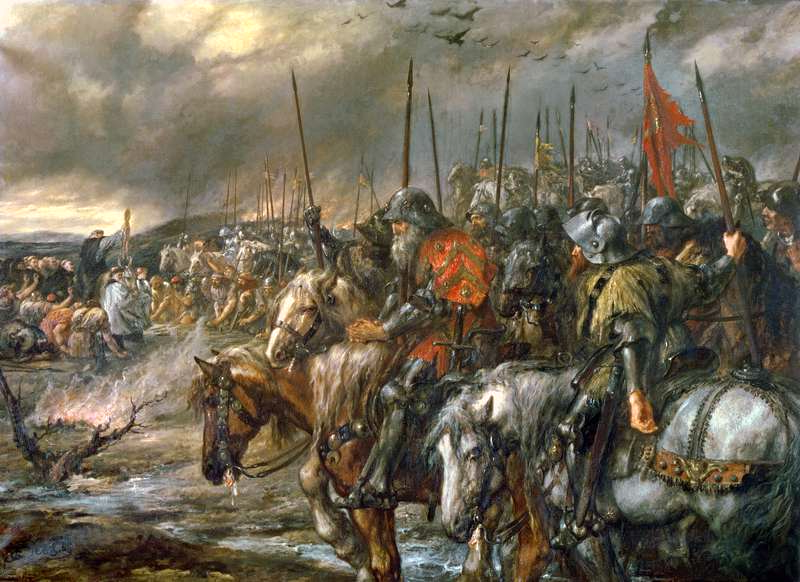1415 St Crispin’s Day Battle of Agincourt
The Hundred Years War pitted England against France, a a conflict that should easily have been won by the French, a much larger and richer nation. France, however, was militarily hampered by relying on their cavalry of heavily armoured aristocrats in an age when English longbow men could dominate a battle field. After years of a truce, Henry V of England decided to press his (dubious) claim to the French throne and invaded France. On this day in 1415 his small army of 5,000 archers and 800 men-at-arms was forced to meet a much larger French army (perhaps 20,000-30,000 men) in a muddy field near the village of Agincourt.
The English fought on foot with a line stretched between two forest groves that would protect their flanks. In front of their line the archers had hammered in sharp stakes to deter the French horsemen. The French relied on their cavalry, knights eager to be in the first lines so as to benefit from the ransoms they hoped to take from English prisoners. It was a vain hope. Waves of French cavalry were cut down by the archers; those who fell drowned in the mud or had their throats cut by nimble English infantry. Those who were taken prisoner and moved to the rear were murdered when Henry feared they might escape. After losing about 10,000 men in four hours the French retreated and Henry’s force was allowed to slip away with rich booty and high-ranking prisoners.
Today this bloody encounter is remembered by English-speakers mostly for the speech that Shakespeare puts in Henry’ mouth on the eve of the battle but at the time this was the song that was on the lips of folks back home, the “Agincourt Carol”:
- Deo gratias Anglia redde pro victoria!
- [Give thanks, England, to God for victory!]
- Owre Kynge went forth to Normandy
- With grace and myght of chyvalry
- Ther God for hym wrought mervelusly;
- Wherefore Englonde may call and cry
- Chorus
- Deo gratias!
- Deo gratias Anglia redde pro victoria!
- He sette sege, forsothe to say,
- To Harfleur towne with ryal aray;
- That toune he wan and made afray
- That Fraunce shal rewe tyl domesday.
- Chorus
- Then went hym forth, owre king comely,
- In Agincourt feld he faught manly;
- Throw grace of God most marvelsuly,
- He had both feld and victory.
- Chorus
- Ther lordys, erles and barone
- Were slayne and taken and that full soon,
- Ans summe were broght into Lundone
- With joye and blisse and gret renone.
- Chorus
- Almighty God he keep owre kynge,
- His peple, and alle his well-wyllynge,
- And give them grace wythoute endyng;
- Then may we call and savely syng:
- Chorus
